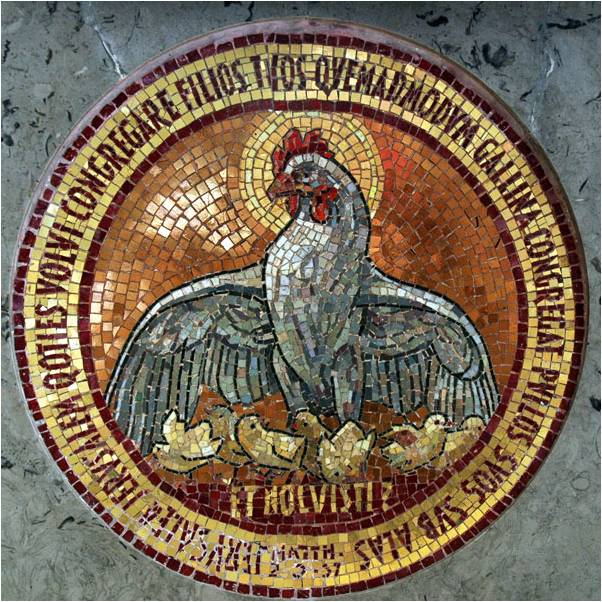 What is your image of God? How did you imagine God as you grew up from childhood? Has that changed? Were you like me who imagined God as the old man in the clouds who remained fairly distant and uninvolved, yet kept account of my sins in some divine book?
What is your image of God? How did you imagine God as you grew up from childhood? Has that changed? Were you like me who imagined God as the old man in the clouds who remained fairly distant and uninvolved, yet kept account of my sins in some divine book?
Preconceived Images
When we attempt to deepen a stagnant relationship with God or rediscover the God who resides everywhere and in all things we must be able to, for a moment, put aside those images we’ve grown up with. William Barry, SJ says, “All the gospels describe the disciples as men who did not begin their relationship with Jesus with a preconceived picture of him that was later substantiated.”[1] They had to get to know Jesus personally through their real-life experience of him. Preconceived images can block our genuinely getting to know God.
You may have noticed that when I write I always use gender-neutral language when referring to God. This is a common practice among many theologians and academics. We all know that God does not have a gender because God is not a human being. However, we have all grown up with the image of God as a male, a Father. Scripture refers to God as Father, and so does Jesus. The word logos in Greek is a masculine word. But the Bible also refers to God using feminine words like sophia in Greek or ruah in Hebrew. The New Testament uses the word pneuma which is neuter. Initially sophia was connected to Jesus, but according to Elizabeth Johnson, logos took over “as it became unseemly, given the developing patriarchal tendencies in the church, to interpret the male Jesus with a female symbol of God.”[2] So there’s some historical context to our use of masculine pronouns and words for God.
 Metaphors for God
Metaphors for God
The scriptures use metaphors to refer to God as mother, father, creator, one who gives birth, one who nurses, and even a mother hen. But these are just metaphors – they do not fully sum up who God is in God’s entirety. And Ignatian spirituality does not constrict God to a particular gender or metaphor. When Maggi Van Dorn, in her post a couple weeks ago, used the pronoun she for God, there was some resistance among readers. Calling God she can be jarring and strange to ears who have always known God as he and Father. But no one is saying that God is a woman, just as no one is assuming that other biblical metaphors mean that God literally nurses or is literally a hen. I think, as Ignatius would tell us that since God meets us and communicates with us uniquely, certain metaphors and images of God are more helpful for some than for others. Maggi, in her post, even quoted Thomas Aquinas who said, “God speaks according to the mode of the receiver.” Use of a particular metaphor or pronoun can highlight a certain aspect of God’s character, keeping in mind that metaphors are still limiting.
Richard Rohr, OFM was a prison chaplain and met many men whose fathers were alcoholic or abusive. For these men, he says, the image of God as a “loving Father” was not always so helpful.
Now you can see what a bind this put us in when we defined God as masculine and called God “Father” exclusively. That’s one metaphor, but it is a metaphor. And so people who never had a loving male in their life, and we come along and say, “God, the Father, loves you,” they have no outlet to plug into, and that was my experience 14 years at the jail. (Richard Rohr, On Being, April 13, 2017)
The Jewish tradition understood God’s divine presence as confined to the Temple, but we know God cannot be confined to any one place, whether a temple, a church, or a seashore. Ignatian spirituality does not restrict God to one or another metaphor or locus. This is the wonderful thing about our faith. God, who has infinite qualities of love, wishes to relate to us in a deeply personal way. I do not believe God says, “You must see me as a Father or Mother or Parent. You must refer to me as male or female.” Perhaps instead, God asks us, “How can you understand me as one who pours out love and wishes to lift burdens?”
For further reading: Maggi Van Dorn offers a comprehensive and and thoughtful theological and scriptural analysis of how we image God on her personal blog.
[1] William A. Barry, S.J., and William J. Connolly, S.J., The Practice of Spiritual Direction (New York: HarperOne, 2009), 23.
[2] “Logos,” Wikipedia, accessed April 20, 2017, https://en.wikipedia.org/wiki/Logos#cite_ref-58
Listen to the podcast version of this post…









Like you in my youth I always thought of God as an old white haired, bewhiskered, male living beyond the clouds with a book recording all my sins. However surely the reason we call God He or Father is simply because until reasonably recently society was always male dominated and it would have been unheard of the address God in any other way. But God, the Creator of the Universe, is too big, too incomprehensible to be defined properly in the simple inadequate language that He gave us to communicate with one another. I understand that St John used to word logos as it was a term that his Greek readers would comprehend. I do not think it matters too much whether we refer to God as male or female – I am sure He or She doesn’t mind. What is important is the name the angel gave in Matthew 1:23 Immanuel meaning God with us or God within us. How you address that God within you is up to you.
” What is important is the name the angel gave in Matthew 1:23 Immanuel meaning God with us or God within us. How you address that God within you is up to you.” Absolutely. 🙂
A man who was in formation to be a deacon (now ordained) sent me a picture of the Trinity with a dignified old white male, a handsome young white male and a dove. As an assignment for his class, he was asked to pick a picture and then write about his image of God and he wondered what I thought of this picture. He was clearly quite happy with it. When I wrote back, quoting Genesis 1:27 to him, I asked him where in this picture I should find some feminine side of God. His response? “Oh”.
We humans are limited in our ability to conceive of God who is infinite. We put God in a box of our own understanding and each person has a different and limited understanding. We each receive God differently and I believe that God accepts each of us as we are and would want us to accept each other as well. Thank you for this great post which is a follow-up to Maggi’s great post as well.
I like this article. It coincides with my beliefs. I have never viewed God as a male. God needs no gender. It is offensive when we are in a group and someone decides to lead a prayer using God as a he. Even if someone believes God is a he, being neutral is the best choice when one is praying in a group or discussing God in a group. God sees us as being equal so we need to see how God represents all of us, not just the White male.
“The Tough Questions” keep us thinking, growing, and learning, ultimately leading us closer to our loving God. I remember as a child, the first time I heard someone refer to God as “She” and was quite surprised, having come from a traditional Catholic background. As an adult, I cherish the God who has no gender and find using gender nonconforming words like “Holy One”, “Loving God”, or “Patient One” to Invoke God in prayer. Keep “The Tough Questions” coming, and may the God of love bless you and your ministry.
You would think, out of all of the people inside and outside the universe whose preferred pronouns might be necessary to ask for or worth respecting, it would be those of God himself. True, the Sophianof God is a feminine aspect/mode of God the Son, but if God habitually and repeatedly prefers to be in the masculine, perhaps you should respect his wishes given his lack of sexual physicality makes it actually necessary to be told.